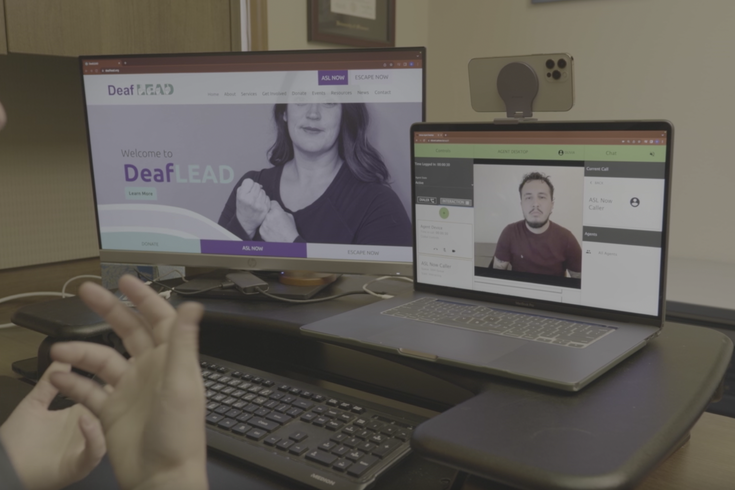
September 11, 2023
 Provided Image/U.S. Department of Health and Human Services
Provided Image/U.S. Department of Health and Human Services
The 988 Suicide and Crisis Lifeline now includes American Sign Language services for deaf and hard of hearing people using videophones. A video call with a crisis counselor using ASL is shown above.
The 988 Suicide and Crisis Lifeline has added American Sign Language services, increasing access to people who are deaf or hard of hearing.
For now, callers must dial (800) 273-8255 from their videophones to access ASL services, but ASL soon will be available by dialing 988 directly, according to the U.S. Department of Health and Human Services. ASL services also are accessible on the hotline's website by clicking the "ASL Now" button and following the prompts.
People who use ASL can be connected to mental health counselors by using the hotline's online chat or by testing 988, too.
The 988 lifeline, which went live last summer, is used by more than 200 state and local call centers in the United States. It provides resources to people contemplating suicide, having mental health crises or seeking help for substance use. Crisis counselors are available to listen and provide support without judgement.
The addition of ASL services is part of an ongoing effort to improve access to the lifeline and its mental health resources. Earlier this year, text and chat features for Spanish speakers were added.
"Individuals across America who use ASL as their primary language can now readily access the support they need during a mental health crisis," HHS Secretary Xavier Becerra said. "With the introduction of 988 ASL services, we are taking a significant stride forward in providing inclusive and accessible support for the deaf and hard of hearing community."
Hearing impairments can lead to mental health issues. In one study, 41% of people with hearing impairments said communication problems, coupled with family stress and prejudice, may contribute to suicidal depression, substance abuse or violent behavior.
Additional research has found that deaf people are twice as likely to have mental health issues. Communication barriers can make it difficult to find mental health services, get accurate diagnoses and seek out effective treatments.
More than 49,000 people died by suicide in the United States in 2022, the highest number ever recorded by the U.S. Centers for Disease Control and Prevention. A 2021 national survey, conducted by the Substance Abuse and Mental Health Services Administration, found that 4.8% of adults and 12.7% of adolescents had serious thoughts of suicide.
People with disabilities who use the 988 lifeline are not asked to disclose their conditions when talking to counselors. Veterans with hearing difficulties can contact the lifeline or contact the Veterans Crisis Line by texting 838255.
Family and friends can support loved ones experiencing mental health issues by asking direct, sensitive questions, looking for warning signs and getting professional help from 911 or 988 when necessary, according to Mayo Clinic.